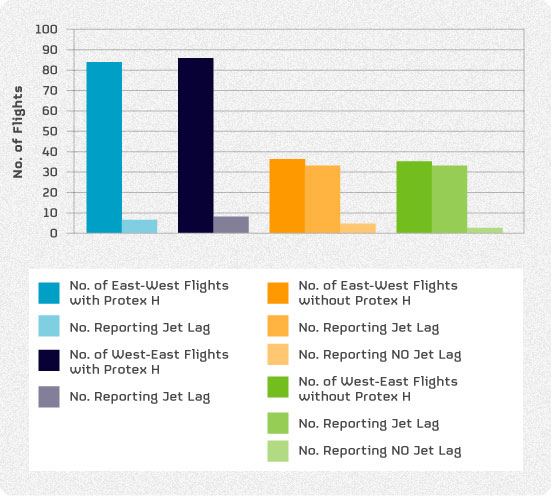Protex-H : Jet Lag Experience
: Jet Lag Experience
Jet lag, medically referred to as desynchronosis, is not a medical condition. It is a physiological condition resulting from alterations to the body's circadian rhythms, including digestion and hormonal activity cycles and the sleep cycle. The word circadian comes from the Latin circa meaning about, and dies meaning day. These cycles are not exactly 24 hours long, hence the "circa". Each hormone has its own cycle of highs and lows, interacting with and influencing the other cycles.
Body temperature, sleepiness, thyroid function, growth hormone, metabolic processes, adrenal hormones, and the sleep hormone melatonin all cycle with daylight. When they are knocked out of synchronisation various cellular stresses result, these are the causes of the side effects of travel known as jet lag. This is caused by rapid long-distance transmeridian (east–west or west–east) travel by jet aircraft. The condition of jet lag may last several days, and a recovery rate of one day per time zone crossed is a fair guideline.
Medical and nutritional scientists working in conjunction with Bradan have personally carried out a number of controlled trials of Bradan’s Heat Shock Protein Accelerator Protex-H. International flights of more than 5 hours across at least four time zones were made using the product which is an EU approved food additive, for one leg of a journey and not for the return and vice versa.
Experience of more than 100 international travellers with and without Protex-H before flying

The graph above shows the results for over 100 trans-meridian journeys, from the UK to countries including the USA, Canada, Chile, Thailand, Singapore and Australia. These are broken down into East West and West East flights both with and without the use of Protex-H at recommended levels. All were regular travellers and were very familiar with the effects of jet lag on their body after such journeys. These symptoms can be quite varied, depending on the amount of time zone alteration, time of day and individual differences. They may include the following: headaches; fatigue; incoordination; loss of placing reflex; irregular sleep patterns; insomnia; grogginess; irritability; mild depression; disorientation and diarrhoea.
With very few exceptions the test set of travellers experienced great relief from the effects of jet lag if they took Protex-H before the flight. The reason for the smaller number travelling without Protex-H was that, where users had experienced the benefits on a flight out they were reluctant not to take it for the return flight.
Regular users now include Medical Practitioners, Pharmacists, Medical Researchers and a wide variety of businessmen and professional and amateur athletes.
Such has been their success with the product, which has no side effects or overdose problems that Bradan is now prepared to offer a money back guarantee if travellers are not satisfied that taking it in the correct dosage before travel virtually removes the serious effects of jet lag.



